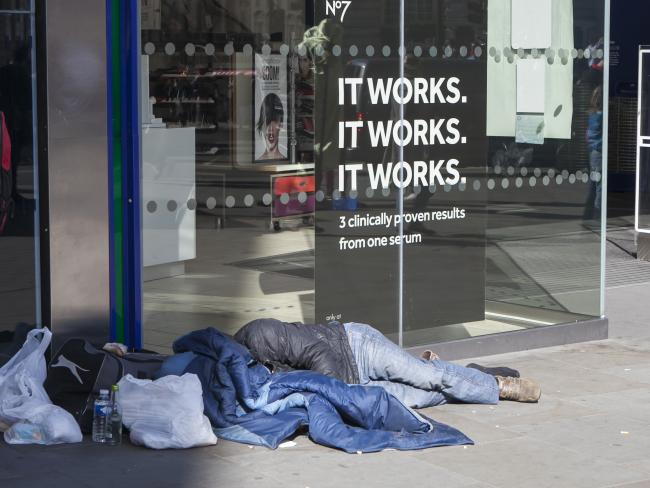22 January 2024

Sleeping rough in Oxford Street, London, and all too common across Britain. Photo Elena Rostunova/Shutterstock.
Record numbers of people are now sleeping rough. Before the 2019 election, the Conservative Party pledged to end rough sleeping in England by 2024. As with almost all their polices, matters have not improved but worsened.
People sleeping rough are the sharp end of homelessness. It’s not only those who bed down in the open air – on the street, in tents, doorways, parks, bus shelters or encampments.
The definition includes people who use buildings or other places not designed for habitation – stairwells, barns, sheds, car parks, cars, derelict boats, stations or “bashes” (makeshift shelters often made of cardboard boxes).
Numbers up
In England alone during September 2023 the official estimate was 8,442 people estimated to be sleeping rough – up by 27 per cent since the previous September. The detail shows how all aspects are worsening, to different degrees.
The number of people newly sleeping rough was up 23 per cent on September 2022, a total of nearly 3,000. Around 3,400 people were sleeping rough on a single night – up 18 per cent on the previous year.
Those sleeping rough after leaving an institution – 769 people – was up 43 per cent in just 3 months, since June 2023. Over the same period there was a 16 per cent increase in sleeping rough long term – around 2,700 people. And just over 1,000 people were returning to sleeping rough – up 5 per cent since June 2023.
“The true number of rough sleepers is much larger than the government acknowledges.”
A government scheme to house rough sleepers during the pandemic “exposed the scale” of the issue, said the Public Accounts Committee in its March 2021 report. But the committee said the true number of rough sleepers was nearly nine times official estimates. They said it was a “much larger” issue than the government had acknowledged.
Outstripped
The latest official estimate at that time of the number of people sleeping rough was 2,688, down from 4,266 in autumn 2019. But the number of homeless people given accommodation through the Everyone In initiative scheme far outstripped the government figures.
The committee praised the initiative, launched in March 2020 due to the Covid pandemic. It took over 37,000 people off the streets by January 2021. The committee said that helped to avert more than 20,000 infections.
Local councils in England got an initial share of £3.2 million to provide accommodation for rough sleepers, often in hotels or hostels. Overall, councils in England received over £700 million to help tackle homelessness during 2020-21, including providing accommodation for rough sleepers.
No plan
But the Public Accounts Committee said that the Ministry for Housing, Communities and Local Government “still does not have a plan” to achieve this commitment. Local homelessness services have been cut by £1 billion a year and have lost 9,000 beds since 2010.
In January 2021, the National Audit Office had also called on the government to review its rough sleeping strategy in light of the figures from Everyone In, claiming it was “out of step” with the problem. The head of the NAO said “Understanding the size of this population, and who needs specialist support, is essential to achieve its ambition to end rough sleeping.”
Labour MP Meg Hillier, who chairs the Public Accounts Committee, said, “Everyone In was a success with local authorities and voluntary organisations working to help people living on the street into hostels and hotel rooms in a matter of days.
Exposed
“But the Everyone In initiative has exposed the scale of the task the Ministry of Housing faces to meet the government’s commitment to end rough sleeping in three years.” She added: “Rough sleeping was a massive public health issue long before the pandemic, and much larger than government has previously publicly acknowledged.
“[The ministry] now has a huge opportunity to capitalise on this success in the pandemic response and begin to reverse its long record of failed and abandoned housing targets and policies. People without recourse to public funds are still left exposed and risk losing support. Support for these people is urgent.”
Despite those words and several other reports and strategies, the government has not addressed the situation in any practical way. The impact of rising costs on individuals and funding cuts for local councils has increased pressure on people vulnerable to becoming homeless. And as Shelter reported last November the government policy of freezing the local housing allowance is having a direct impact.
